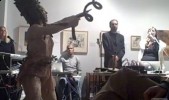Well Dada my Dada: what does it mean these days for art to be “avant-garde”? Even in the celebrated sixties, one could legitimately wonder what experimental arts elements were being introduced that hadn’t already been exploited to the max decades earlier by the Dadaists, the Futurists, the Surrealists, etc. Beyond technology, then and now, what could truly be new?
Fringe Audio, in this year’s Asheville FringeArts Festival, suggested that this was the wrong question. “Avant-garde” has become a state of mind. It isn’t so much about advancing our arts into hitherto unknown territory — because really, how could you? — as establishing and maintaining a permanent position outside the mainstream.
The venue was the Black Mountain College Museum + Arts Center, and what could be more appropriate? From 1933-1957, nearby Black Mountain College may have aggregated more established and would-be “experimental” artists than any other institution in America. Faculty members John Cage and Merce Cunningham, the late composer and choreographer, could well be considered patron saints of Fringe Audio, as could such filmmakers Jonas Mekas, Maya Deren, and Stan Brakhage. They all wanted to make us hear and see the world in ways more traditional works can’t, and that’s what the Fringe Audio participants do. If one wanted to escape from the worlds of commercial music, film, and dance for a couple of hours, this was a good place to be.
The Saturday night program began with Elisa Faires’ “Song of the Trees,” and it was a work of true beauty, rooted in the human voice. Faires would sing a simple, wordless phrase into a microphone, and that phrase would repeat through the sound system as Faires manipulated it and its successors with a computer. She and her compatriots added instrumental sounds to the mix, mostly percussive, from a variety of instruments, including what appeared to be an electrified briefcase played like a bellows and a wire cage played with a bow. Such work can readily provoke the philistine comment, “My five-year-old could do better than that,” which just isn’t so. Faires is an accomplished, thoughtful, dedicated artist. Her music may strike you as unusual, but it glows.
“Song of the Trees” evolved seamlessly into the accompaniment for “P_H_Daphne,” conceived and directed by Julie Becton Gillum in collaboration with Sara Baird, who danced. As indicated in the program note, this piece draws on the myth of Apollo and Daphne (the latter, in attempting to escape the love of the former, being transformed into a tree) and the post-WWII Japanese dance discipline, Butoh. Dressed as one might imagine a wood nymph to be, but with the white face makeup of Butoh and part of a tree for a headpiece, Baird worked her way through the audience to a nature stage-setting dominated by what might have been the poles of a teepee. All of her gestures were exaggerated to the point of grotesquerie; she writhed with an encircling, wooden snake; she humped and tongued one of the poles. Narrative, there was none, but the music and the movement played with and against one another evocatively. The effect, though strange, was emotional. Gillum and Baird, too, are true artists.
Next up: Vincent Wrenn’s “Variations on Chokma,” based on the Kabbalah in ways reminiscent of Cage’s use of the I Ching. Wrenn’s explanation may have required an adept for fullest understanding, but what was clear was that Wrenn wished to simulate in sound the birth of consciousness in creation. Using his own system, in which the musical scale is divided into the 360 degrees of a circle, and employing an analog synthesizer, he produced a half hour piece rooted in drone and distortion, which had a visceral impact so extreme one could imagine some listeners being driven away, possibly in pain. Standing at a laptop, Jason Scott Furr projected and played with a film of sculptures that resembled a stand of trees, blending tellingly with Wrenn’s difficult but deeply felt music.
The second half of the evening was interesting, but perhaps too much. Both Sturgeon Hoff’s “Randomness” and Xambuca’s “Reciprocity – Tristan Tzara Has a Heart of Gas” explored relatively similar electronic sonic landscapes and were accompanied by more of Furr’s film projections, which kept returning to the eye. These pieces, each more than a half hour, would have done better as gallery installations one could visit, leave, and return to periodically.
There was more, but this reviewer had to catch the LaZoom Bus. It provided the variety much of Fringe Audio lacked.
Oh, and as for what the avant-garde is and where it’s going: none can say. It’s a fair bet, though, that for the foreseeable future, Apple MacBooks will play a major role. Once upon a time, avant-garde composers and filmmakers had to manipulate recording tape and film with razor blades and Scotch tape. Everything’s digital now.
Videos by Aiyanna Sezak-Blatt.




” . . .’Avant-garde’ has become a state of mind. It isn’t so much about advancing our arts into hitherto unknown territory — because really, how could you? — as establishing and maintaining a permanent position outside the mainstream. . . ”
A great formulation. Mr. Samuels writes great reviews.